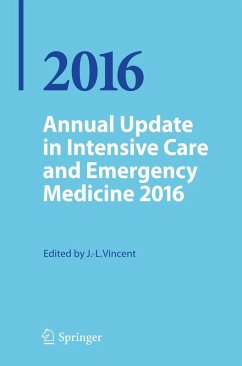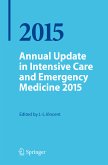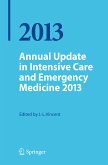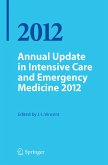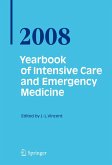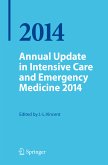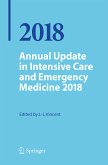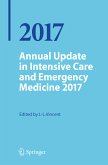Annual Update in Intensive Care and Emergency Medicine 2016 (eBook, PDF)
Redaktion: Vincent, Jean-Louis
105,95 €
105,95 €
inkl. MwSt.
Sofort per Download lieferbar

53 °P sammeln
105,95 €
Als Download kaufen

105,95 €
inkl. MwSt.
Sofort per Download lieferbar

53 °P sammeln
Jetzt verschenken
Alle Infos zum eBook verschenken
105,95 €
inkl. MwSt.
Sofort per Download lieferbar
Alle Infos zum eBook verschenken

53 °P sammeln
Annual Update in Intensive Care and Emergency Medicine 2016 (eBook, PDF)
Redaktion: Vincent, Jean-Louis
- Format: PDF
- Merkliste
- Auf die Merkliste
- Bewerten Bewerten
- Teilen
- Produkt teilen
- Produkterinnerung
- Produkterinnerung

Bitte loggen Sie sich zunächst in Ihr Kundenkonto ein oder registrieren Sie sich bei
bücher.de, um das eBook-Abo tolino select nutzen zu können.
Hier können Sie sich einloggen
Hier können Sie sich einloggen
Sie sind bereits eingeloggt. Klicken Sie auf 2. tolino select Abo, um fortzufahren.

Bitte loggen Sie sich zunächst in Ihr Kundenkonto ein oder registrieren Sie sich bei bücher.de, um das eBook-Abo tolino select nutzen zu können.
The Annual Update compiles the most recent developments in experimental and clinical research and practice in one comprehensive reference book. The chapters are written by well recognized experts in the field of intensive care and emergency medicine. It is addressed to everyone involved in internal medicine, anesthesia, surgery, pediatrics, intensive care and emergency medicine.
- Geräte: PC
- ohne Kopierschutz
- eBook Hilfe
- Größe: 10.4MB
Andere Kunden interessierten sich auch für
![Annual Update in Intensive Care and Emergency Medicine 2015 (eBook, PDF) Annual Update in Intensive Care and Emergency Medicine 2015 (eBook, PDF)]() Annual Update in Intensive Care and Emergency Medicine 2015 (eBook, PDF)73,95 €
Annual Update in Intensive Care and Emergency Medicine 2015 (eBook, PDF)73,95 €![Annual Update in Intensive Care and Emergency Medicine 2013 (eBook, PDF) Annual Update in Intensive Care and Emergency Medicine 2013 (eBook, PDF)]() Annual Update in Intensive Care and Emergency Medicine 2013 (eBook, PDF)129,95 €
Annual Update in Intensive Care and Emergency Medicine 2013 (eBook, PDF)129,95 €![Annual Update in Intensive Care and Emergency Medicine 2012 (eBook, PDF) Annual Update in Intensive Care and Emergency Medicine 2012 (eBook, PDF)]() Annual Update in Intensive Care and Emergency Medicine 2012 (eBook, PDF)113,95 €
Annual Update in Intensive Care and Emergency Medicine 2012 (eBook, PDF)113,95 €![Yearbook of Intensive Care and Emergency Medicine 2008 (eBook, PDF) Yearbook of Intensive Care and Emergency Medicine 2008 (eBook, PDF)]() Yearbook of Intensive Care and Emergency Medicine 2008 (eBook, PDF)105,95 €
Yearbook of Intensive Care and Emergency Medicine 2008 (eBook, PDF)105,95 €![Annual Update in Intensive Care and Emergency Medicine 2014 (eBook, PDF) Annual Update in Intensive Care and Emergency Medicine 2014 (eBook, PDF)]() Annual Update in Intensive Care and Emergency Medicine 2014 (eBook, PDF)113,95 €
Annual Update in Intensive Care and Emergency Medicine 2014 (eBook, PDF)113,95 €![Annual Update in Intensive Care and Emergency Medicine 2018 (eBook, PDF) Annual Update in Intensive Care and Emergency Medicine 2018 (eBook, PDF)]() Annual Update in Intensive Care and Emergency Medicine 2018 (eBook, PDF)137,95 €
Annual Update in Intensive Care and Emergency Medicine 2018 (eBook, PDF)137,95 €![Annual Update in Intensive Care and Emergency Medicine 2017 (eBook, PDF) Annual Update in Intensive Care and Emergency Medicine 2017 (eBook, PDF)]() Annual Update in Intensive Care and Emergency Medicine 2017 (eBook, PDF)113,95 €
Annual Update in Intensive Care and Emergency Medicine 2017 (eBook, PDF)113,95 €-
-
-
The Annual Update compiles the most recent developments in experimental and clinical research and practice in one comprehensive reference book. The chapters are written by well recognized experts in the field of intensive care and emergency medicine. It is addressed to everyone involved in internal medicine, anesthesia, surgery, pediatrics, intensive care and emergency medicine.
Dieser Download kann aus rechtlichen Gründen nur mit Rechnungsadresse in A, B, BG, CY, CZ, D, DK, EW, E, FIN, F, GR, HR, H, IRL, I, LT, L, LR, M, NL, PL, P, R, S, SLO, SK ausgeliefert werden.
Produktdetails
- Produktdetails
- Verlag: Springer International Publishing
- Seitenzahl: 502
- Erscheinungstermin: 23. März 2016
- Englisch
- ISBN-13: 9783319273495
- Artikelnr.: 44895834
- Verlag: Springer International Publishing
- Seitenzahl: 502
- Erscheinungstermin: 23. März 2016
- Englisch
- ISBN-13: 9783319273495
- Artikelnr.: 44895834
- Herstellerkennzeichnung Die Herstellerinformationen sind derzeit nicht verfügbar.
Dr Vincent is Professor of intensive care at the University of Brussels, and intensivist in the Department of Intensive Care at Erasme University Hospital in Brussels. He is President of the World Federation of Societies of Intensive and Critical Care Medicine (WFSICCM) and a Past-President of the Belgian Society of Intensive Care Medicine (SIZ), the European Society of Intensive Care Medicine (ESICM), the European Shock Society (ESS), and the International Sepsis Forum (ISF). He is a member of the Royal Medical Academy of Belgium.
Dr. Vincent has signed more than 850 original articles, some 400 book chapters and review articles, 930 original abstracts, and has edited 99 books. He is co-editor of the Textbook of Critical Care (Elsevier Saunders, 7th Edition) and the "Encyclopedia of Intensive Care Medicine†(Springer). He is editor-in-chief of "Critical Care", "Current Opinion in Critical Care", and "ICU Management" and member of the editorial boards of about 30 journals.
For 36 years, Dr Vincent has been chairman of the International Symposium on Intensive Care and Emergency Medicine, the largest international meeting in this field, which gathers more than 6000 participants every year in Brussels.
He has received several awards, including the Distinguished Investigator Award of the Society of Critical Care Medicine and the College Medalist Award of the American College of Chest Physicians He is a recipient of the "Society Medal†(lifetime award) of the European Society of Intensive Care Medicine and has received the prestigious Belgian scientific award of the FRS-FNRS (Prix Scientifique Joseph Maisin-Sciences biomedicales cliniques).
Dr. Vincent has signed more than 850 original articles, some 400 book chapters and review articles, 930 original abstracts, and has edited 99 books. He is co-editor of the Textbook of Critical Care (Elsevier Saunders, 7th Edition) and the "Encyclopedia of Intensive Care Medicine†(Springer). He is editor-in-chief of "Critical Care", "Current Opinion in Critical Care", and "ICU Management" and member of the editorial boards of about 30 journals.
For 36 years, Dr Vincent has been chairman of the International Symposium on Intensive Care and Emergency Medicine, the largest international meeting in this field, which gathers more than 6000 participants every year in Brussels.
He has received several awards, including the Distinguished Investigator Award of the Society of Critical Care Medicine and the College Medalist Award of the American College of Chest Physicians He is a recipient of the "Society Medal†(lifetime award) of the European Society of Intensive Care Medicine and has received the prestigious Belgian scientific award of the FRS-FNRS (Prix Scientifique Joseph Maisin-Sciences biomedicales cliniques).
Part I. Infections and antibiotics.- Interpreting Procalcitoninat the Bedside.- Reducing Antibiotic Use in the ICU: A Time-based Approach to RationalAntimicrobial Use.- Plasmacytoid Dendritic Cells in Severe Influenza Infection.-Critically Ill Patients with Middle East Respiratory Syndrome Coronavirus Infection.-Part II. Sepsis.- Immunomodulation: The Future for Sepsis?.- Norepinephrine in SepticShock: Five Reasons to Initiate it Early.- Myths and Facts Regarding Lactate inSepsis.- Part III. Renal issues.- Creatinine-based Definitions: From Baseline Creatinineto Serum Creatinine Correction in Intensive Care.- The Detrimental Cross-talk betweenSepsis and AKI: New Pathogenic Mechanisms, Early Biomarkers and Targeted Therapies.-Timing of Acute Renal Replacement Therapy.- (Multiple) Organ Support Therapy beyondAKI.- Part IV. Fluid therapy.- Crystalloid Fluid Therapy.- Balanced Crystalloidsfor Septic Shock Resuscitation.- Part V. Bleeding.- EmergencyReversal Strategies for Anticoagulants and Anti-platelet Agents.- Part VI. Cardiovascularsystem.- Bedside Myocardial Perfusion Assessment with Echocardiography Contrast.-Pathophysiological Determinants of Cardiovascular Dysfunction in Septic Shock.-Cardiovascular Response to ECMO.- Mechanical Circulatory Support in the New Era:An Overview.- Part VII. Cardiac arrest.- Cardiac arrest in the Elderly:Epidemiology and Outcome.- Regional Systems of Care: The Final Link in the "Chainof Survival" Concept for Out-of-hospital Cardiac Arrest.- Cardiac ArrestCenters.- Part VIII. Oxygenation and respiratory failure.- High-flow NasalCannula Oxygen Therapy: Physiological Effects and Clinical Data.- The PotentialValue of Monitoring the Oxygen Reserve Index in Patients Receiving Oxygen.- VariableVentilation from Bench to Bedside.- Monitoring Respiratory Effort by Means ofthe Electrical Activity of the Diaphragm.- Dissipated Energy is a Key Mediatorof VILI: Rationale for using Low Driving Pressures.- Corticosteroidsas Adjunctive Therapy in Severe Community-acquired Pneumonia.-Part IX. Abdominal issues.- The Neglected Role of Abdominal Compliance inOrgan-organ Interactions.- Part X Metabolic support.- Metabonomics and IntensiveCare.- The Rationale for Permissive Hyperglycemia in Critically Ill Patientswith Diabetes.- Indirect Calorimetry in Critically Ill Patients. Concept, CurrentUse, and Future Challenges.- Part XI. Ethical issues.- Managing Intensive CareSupply-demand Imbalance.- Advances in the Management of the Potential OrganDonor after Neurologic Determination of Death.- Humanizing Intensive Care:Theory, Evidence and Possibilities.- Part XII. Applying new technology.- UltrasoundSimulation Education for Intensive Care and Emergency Medicine.- Virtual Patientsand Virtual Cohorts: A New Way to Think about the Design and Implementation of PersonalizedICU Treatments.- Part XIII. Intensive care unit trajectories: The bigger picture.-Predicting Cardiorespiratory Instability.- Long-termOutcomes after CriticalIllness Relevant to Randomized Clinical Trials.- Long-term Consequences of AcuteInflammation in the Surgical Patient: New Findings and Perspectives.- Kairotropy:Discovering Critical Illness Trajectories using Clinical Phenotypes with BigData.
Part I. Infections and antibiotics.- Interpreting Procalcitoninat the Bedside.- Reducing Antibiotic Use in the ICU: A Time-based Approach to RationalAntimicrobial Use.- Plasmacytoid Dendritic Cells in Severe Influenza Infection.-Critically Ill Patients with Middle East Respiratory Syndrome Coronavirus Infection.-Part II. Sepsis.- Immunomodulation: The Future for Sepsis?.- Norepinephrine in SepticShock: Five Reasons to Initiate it Early.- Myths and Facts Regarding Lactate inSepsis.- Part III. Renal issues.- Creatinine-based Definitions: From Baseline Creatinineto Serum Creatinine Correction in Intensive Care.- The Detrimental Cross-talk betweenSepsis and AKI: New Pathogenic Mechanisms, Early Biomarkers and Targeted Therapies.-Timing of Acute Renal Replacement Therapy.- (Multiple) Organ Support Therapy beyondAKI.- Part IV. Fluid therapy.- Crystalloid Fluid Therapy.- Balanced Crystalloidsfor Septic Shock Resuscitation.- Part V. Bleeding.- EmergencyReversal Strategies for Anticoagulants and Anti-platelet Agents.- Part VI. Cardiovascularsystem.- Bedside Myocardial Perfusion Assessment with Echocardiography Contrast.-Pathophysiological Determinants of Cardiovascular Dysfunction in Septic Shock.-Cardiovascular Response to ECMO.- Mechanical Circulatory Support in the New Era:An Overview.- Part VII. Cardiac arrest.- Cardiac arrest in the Elderly:Epidemiology and Outcome.- Regional Systems of Care: The Final Link in the "Chainof Survival" Concept for Out-of-hospital Cardiac Arrest.- Cardiac ArrestCenters.- Part VIII. Oxygenation and respiratory failure.- High-flow NasalCannula Oxygen Therapy: Physiological Effects and Clinical Data.- The PotentialValue of Monitoring the Oxygen Reserve Index in Patients Receiving Oxygen.- VariableVentilation from Bench to Bedside.- Monitoring Respiratory Effort by Means ofthe Electrical Activity of the Diaphragm.- Dissipated Energy is a Key Mediatorof VILI: Rationale for using Low Driving Pressures.- Corticosteroidsas Adjunctive Therapy in Severe Community-acquired Pneumonia.-Part IX. Abdominal issues.- The Neglected Role of Abdominal Compliance inOrgan-organ Interactions.- Part X Metabolic support.- Metabonomics and IntensiveCare.- The Rationale for Permissive Hyperglycemia in Critically Ill Patientswith Diabetes.- Indirect Calorimetry in Critically Ill Patients. Concept, CurrentUse, and Future Challenges.- Part XI. Ethical issues.- Managing Intensive CareSupply-demand Imbalance.- Advances in the Management of the Potential OrganDonor after Neurologic Determination of Death.- Humanizing Intensive Care:Theory, Evidence and Possibilities.- Part XII. Applying new technology.- UltrasoundSimulation Education for Intensive Care and Emergency Medicine.- Virtual Patientsand Virtual Cohorts: A New Way to Think about the Design and Implementation of PersonalizedICU Treatments.- Part XIII. Intensive care unit trajectories: The bigger picture.-Predicting Cardiorespiratory Instability.- Long-termOutcomes after CriticalIllness Relevant to Randomized Clinical Trials.- Long-term Consequences of AcuteInflammation in the Surgical Patient: New Findings and Perspectives.- Kairotropy:Discovering Critical Illness Trajectories using Clinical Phenotypes with BigData.
